An ict role in key sectors of development of society реферат
Обновлено: 04.07.2024
The purpose of studying this discipline - to train students and other categories of students is using of modern computer information technology as a tool which solves scientific and practical problems in their subject area at a high professional level, as well as to participate in the development and implementation of these technologies in the framework of corporate information systems level setting objectives and monitoring of the decision that is so necessary for the modern manager.
As a result the course of discipline students must:
• be aware the technical support of modern information technology, especially its organization and operation, its prospects for development;
• familiar with the mathematical, software, organizational and other kinds of computer software in-information technologies;
• gain an understanding the development of computer information technology in their subject area;
• learn to use modern means of computer technologies in solving problems in their subject area;
• be able to navigate and search information on the INTERNET;
• be able to work with the electronic services and INTERNET network services.
Collection of lectures include learning of such packets as MS Office, SQL and etc. The usage of the methodical instructions allows you to consider the main possibilities of the most popular programs on operation with computer programms.
Lecture №1. An ICT role in key sectors of development of society. Standards in the field of ICT.
Purpose: To prepare students using of modern computer information technology.
Plan:
1.Definition of ICT. Subject ICT and its purposes. An ICT role in key sectors of development of society.
2.Standards in the field of ICT. Communication between ICT and achievement of the objectives of a sustainable development in the Millennium Declaration.
1.Definition of ICT. Subject ICT and its purposes. An ICT role in key sectors of development of society.
Under the information and communication technologies is offered to understand the complex objects, actions, and rules relating to the preparation, processing and delivery of information at the personal, mass communication and production, as well as all technologies and sectors, providing integrated these processes.
Information and communication technologies (ICT) - a set of methods, workflows and software and hardware tools that are integrated with the aim of collecting, processing, storage, distribution, display and use of information for the benefit of its members
To date, the concept of IT includes microelectronics, development and production of computers and software, connection and telephony, mobile services, providing Internet access, providing information resources of the Internet, as well as a variety of cultural phenomena associated with these areas of activity and rules (both formal and informal) that govern these areas of activity.
ICT Tools
By means of modern information and communication technologies to understand the software, firmware and hardware, as well as devices that operate on the basis of a microprocessor, computer technology, as well as modern facilities and broadcast of information systems, information exchange, ensuring operation for the collection, the production, accumulation, storage, processing, communication and access to information resources of computer networks (including global).
By means of modern information and communication technologies include computers, PC, terminal equipment kits for computers of all classes, local area networks, the input-output device information input means and manipulation of text and graphic information, means of archiving large volumes of information, and other peripheral equipment modern COMPUTER; means for converting data from the graphics or audio data to digital representation and vice versa; tools and devices to manipulate audiovisual information (on the basis of technology and Multimedia "Virtual Reality"); artificial intelligence system; computer graphics system, programming systems (programming languages, compilers, compilers, operating systems, software packages, etc..), modern means of communication, providing information user interaction both at the local level (for example, within a single organization or multiple organizations) and global (as part of the global information environment).
Вы можете изучить и скачать доклад-презентацию на тему An ICT role in key sectors of development of society. Standards in the field of. Презентация на заданную тему содержит 20 слайдов. Для просмотра воспользуйтесь проигрывателем, если материал оказался полезным для Вас - поделитесь им с друзьями с помощью социальных кнопок и добавьте наш сайт презентаций в закладки!




















Plan: I. Introduction II. Main part 1. ICT definition. The subject of ICT and its objectives. The role of ICT in the development of society. 2. Standards in the field of ICT. Communication between ICT and achievement of the objectives of a sustainable development in the Millennium Declaration. 3. ICT in Key Sectors: Telecommunications Public Sector Management Education Health Agriculture and Food Security III. Conclusion
Introduction Head of the state, Nursultan Nazarbayev, initiated a Nation plan "100 specific steps", oriented to production modernization, increasing of investment activity, prevention of reduced income and creating new vacancies. All this will promote employment of population, including ICT field. This means that, ICT is very common in the modern world. And everyone should know the subject and purpose of the industry.
Information and communication technologies (ICT) - a set of methods, workflows and software and hardware tools that are integrated with the aim of collecting, processing, storage, distribution, display and use of information for the benefit of its members Information and communication technologies (ICT) - a set of methods, workflows and software and hardware tools that are integrated with the aim of collecting, processing, storage, distribution, display and use of information for the benefit of its members To date, the concept of IT includes microelectronics, development and production of computers and software, connection and telephony, mobile services, providing Internet access, providing information resources of the Internet, as well as a variety of cultural phenomena associated with these areas of activity and rules (both formal and informal) that govern these areas of activity.
The potential of ICT as a development tool rests on its ability to improve the way people do things. The rapid changes and advancements in modern technology present a unique opportunity for developing countries to leapfrog intermediate steps in development while improving the quality and broadening the reach of public services. The strategic and effective use of ICT—combined with a reform-oriented mindset, necessary set of skills, institutional structure and capacity, appropriate business models, as well as policy and regulatory environments—can facilitate fast and efficient delivery of public services in key sectors.
ICT-standards system - a set of normative and technical and regulatory guidance documents, including a set of interrelated standards and other documents in the field of standardization related to ICT, documents defining the methodology of development, coordination, approval, modification, deployment, use and replacement, including a methodology to assess facilities for compliance with these standards and other documents in the field of standardization.
ICT industry - as a specific field of activity, which includes research, creation, development, evaluation, procurement, acquisition, implementation, operation and utilization of ICTs. It covers thus work as a developer and ICT suppliers and customers and users of ICT, including the activities for the implementation, operation and utilization of ICTs.
Industry Standard (IS) - standard related to processes, products and other aspects of a particular field of activity (whether commercial or not aimed at profit). In this document, under the industry standard it refers to a standard or other document in the field of standardization, designed for the use of ICT. The procedure for the development and application of established IS specialized body of public administration.
Standard - a document in the field of standardization, standardization of relevant principles, covering categories such documents as the standard of organization, the standard non-profit association, the industry standard or set of rules (the industry), the national standard, international standard.
International standard - a standard adopted by an international organization. National standard - a standard adopted by a national authority of the Republic of Kazakhstan for Standardization. Non-profit association Standard - a standard non-profit professional organization (union, association, etc.), designed for wide application by different stakeholders. The order of development of the standard and non-profit association established this association and is harmonized with the state and industry standards development orders.
Organization Standard - a standard developed and approved by the organization itself, based on the necessity of its use to improve production and quality assurance of products, works and services, as well as for the dissemination and use of knowledge in different fields of research results (the test), measurement and development.
Telecommunications ADB support for telecommunications and ICT is changing lives across the region. Farmers and fisher folk receive timely weather forecasts through their mobile phones, remote village schools connect to educational resources through internet -enabled computer labs, and citizens transact with their governments more efficiently through online systems. ADB is also helping to expand telecommunication networks, provide shared ICT access facilities like Community e-Centers (CeCs), and develop innovative and relevant ICT applications.
ICT in Education ICT can improve the efficiency and quality of education at all levels. Part of ADB's strategy to support its education policy principles is promoting "experimentation with, and dissemination of, innovative strategies and technologies in education." This involves developing appropriate e-applications to help DMCs leapfrog conventional means of learning and teaching . For example, Uzbekistan’s Information and Communications Technology in Basic Education Project, supported by a $30-million ADB loan, is bringing education to remote rural areas and benefiting 540,000 students.
ICT in Public Sector Management ADB encourages governments to adopt both innovative approaches and modern technologies to promote good governance. This is done not just by shifting from manual, paper-based processes to automated systems, but also by creating new skills, building human and institutional capacity, and creating an enabling policy and regulatory environment to facilitate public sector reforms.
ICT in Health ICT can be a powerful tool for improving health and related services. ADB projects are helping to improve dissemination of public health information, bridge the gap in consultation, diagnosis, and treatment between resource-rich and resource-poor hospitals, facilitate learning, enhance the ability to monitor diseases and other health issues, and make health administration more efficient.
ICT in Agriculture and Food Security ADB’s ICT efforts are raising agricultural productivity and the quality of life of farmers and the rural poor by improving information flows, communication, and access to reliable, up-to-date information. This enables strategic decision-making by farmers and prevents or mitigates losses caused by natural disasters.
Conclusion Over time, emphasis on technology-dominated structures should be lessened and ICT should be highlighted more. ICT are people who understand and have expertise on both the technicalities of ICT and the intricacies of development.
Слайды и текст этой презентации
An ICT role in key sectors of society development. Standards in the field of ICT.
Definition of ICT. Subject ICT and its purposes. An ICT role in key sectors of society development. Standards in the field of ICT.
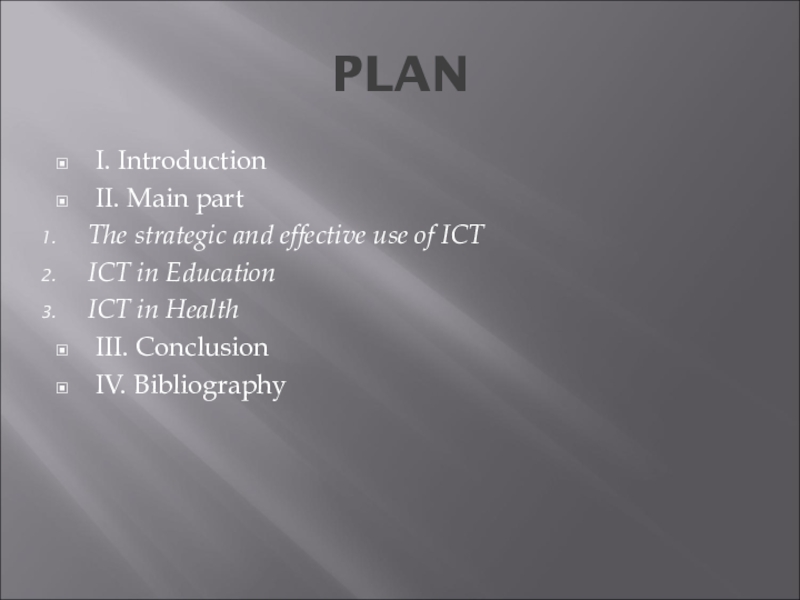
І. Introduction
ІІ. Main part
The strategic and effective use of ICT
ICT in Education
ICT in Health
ІІІ. Сonclusion
ІV. Bibliography
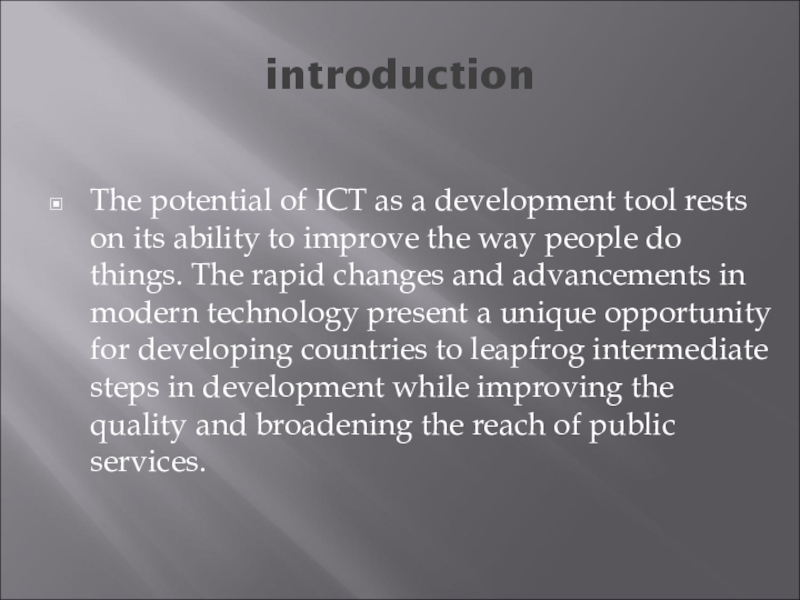
The potential of ICT as a development tool rests on its ability to improve the way people do things. The rapid changes and advancements in modern technology present a unique opportunity for developing countries to leapfrog intermediate steps in development while improving the quality and broadening the reach of public services.
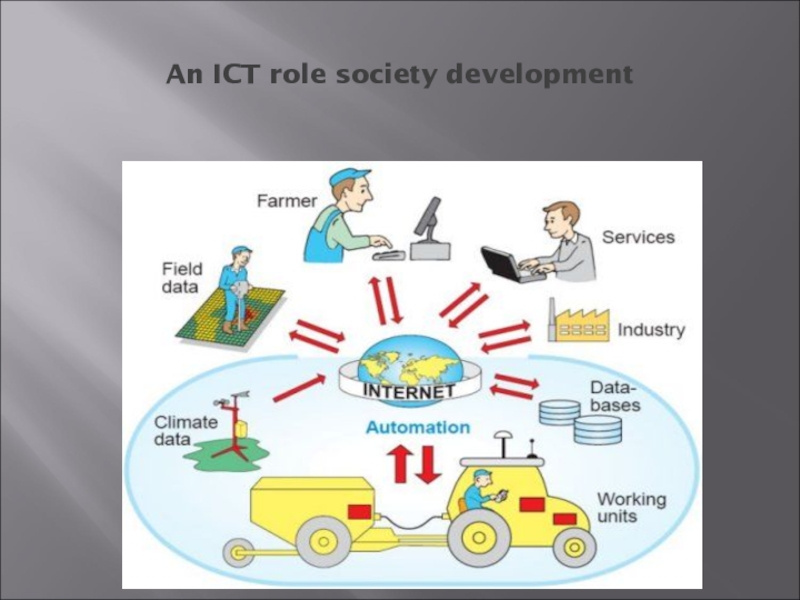
An ICT role society development
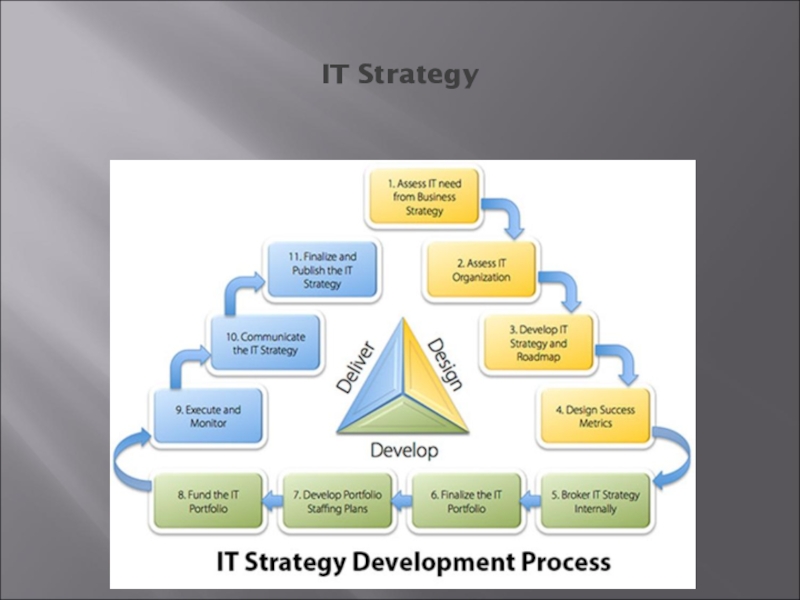
The strategic and effective use of ICT
The strategic and effective use of ICT—combined with a reform-oriented mindset, necessary set of skills, institutional structure and capacity, appropriate business models, as well as policy and regulatory environments—can facilitate fast and efficient delivery of public services in key sectors.
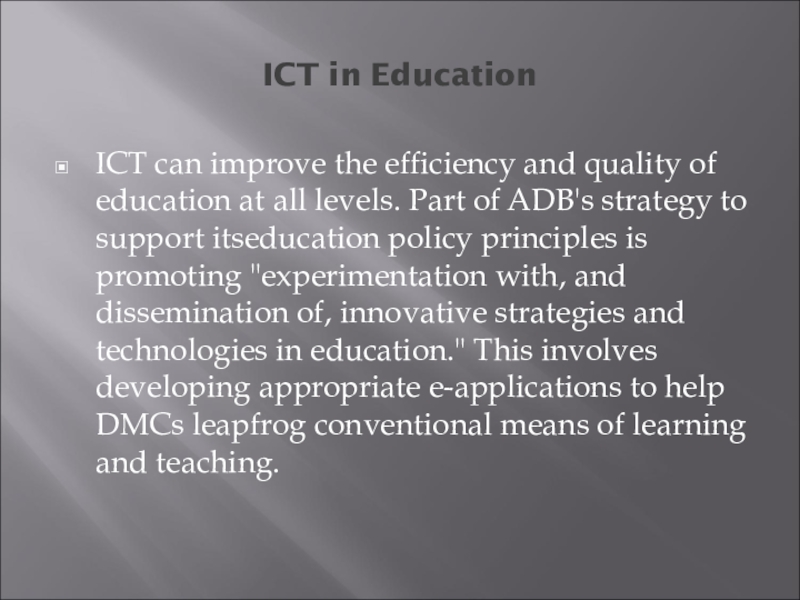
ICT in Education
ICT can improve the efficiency and quality of education at all levels. Part of ADB's strategy to support itseducation policy principles is promoting "experimentation with, and dissemination of, innovative strategies and technologies in education." This involves developing appropriate e-applications to help DMCs leapfrog conventional means of learning and teaching.
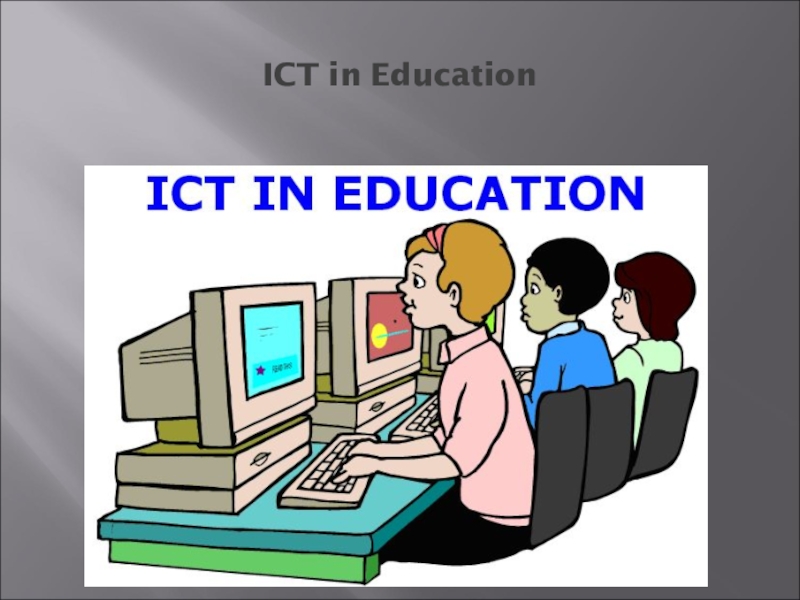
ICT in Education
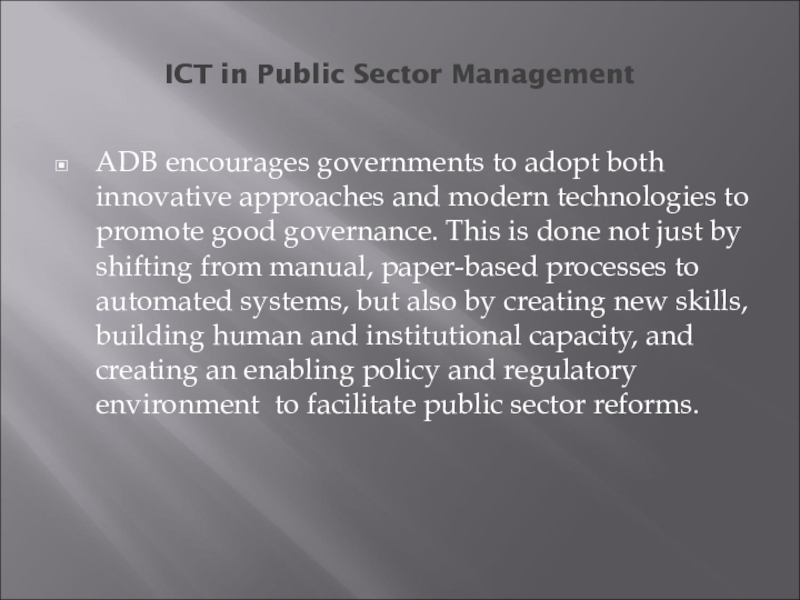
ICT in Public Sector Management
ADB encourages governments to adopt both innovative approaches and modern technologies to promote good governance. This is done not just by shifting from manual, paper-based processes to automated systems, but also by creating new skills, building human and institutional capacity, and creating an enabling policy and regulatory environment to facilitate public sector reforms.
ICT in Public Sector Management
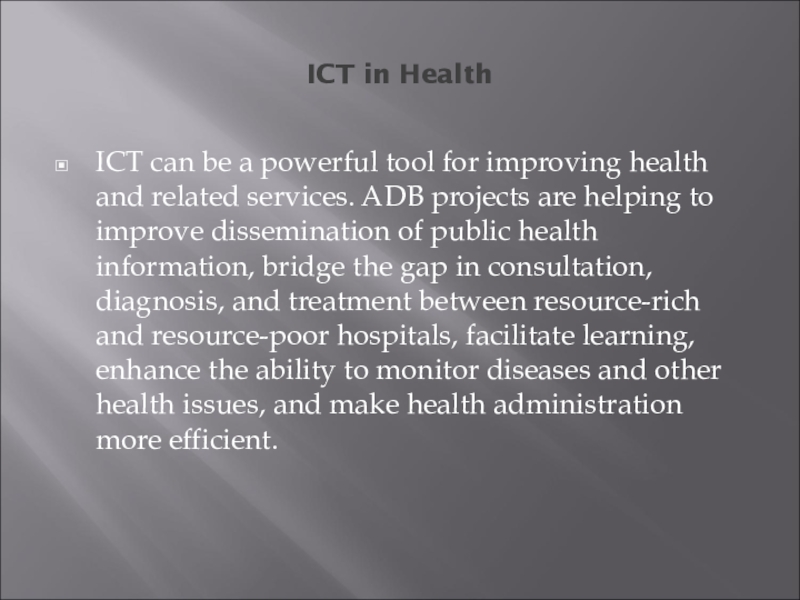
ICT can be a powerful tool for improving health and related services. ADB projects are helping to improve dissemination of public health information, bridge the gap in consultation, diagnosis, and treatment between resource-rich and resource-poor hospitals, facilitate learning, enhance the ability to monitor diseases and other health issues, and make health administration more efficient.
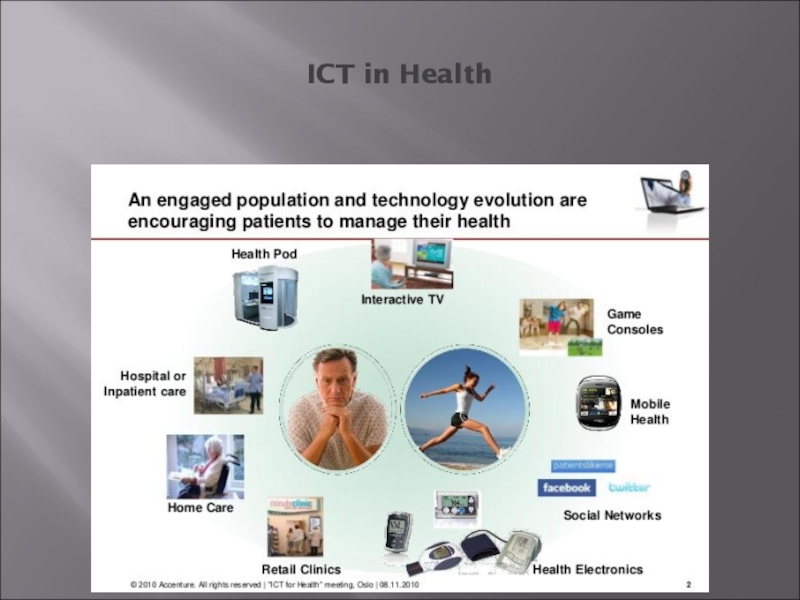
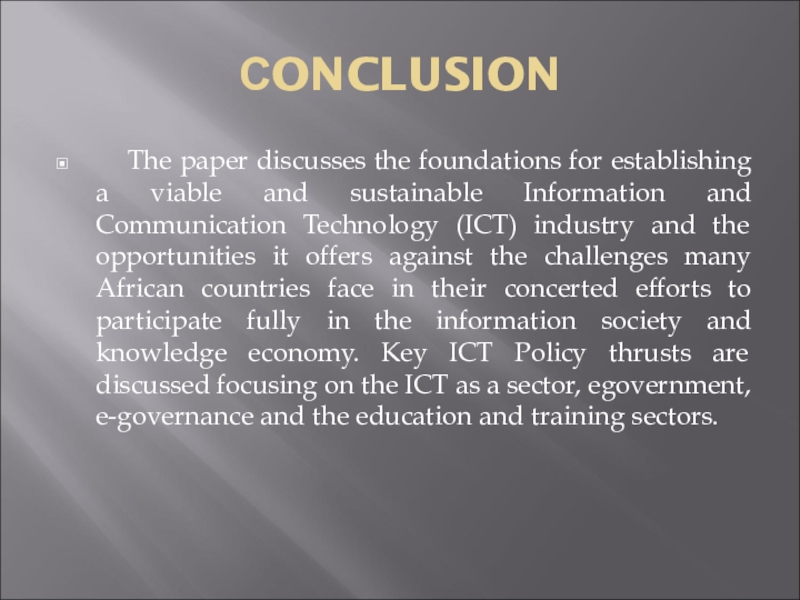
The paper discusses the foundations for establishing a viable and sustainable Information and Communication Technology (ICT) industry and the opportunities it offers against the challenges many African countries face in their concerted efforts to participate fully in the information society and knowledge economy. Key ICT Policy thrusts are discussed focusing on the ICT as a sector, egovernment, e-governance and the education and training sectors.
Zimbabwe National ICT Policy – December 2005
Partnership Framework for ICT Infrastructure development in Africa ‘S M Kundishora at World Congress on ICT for Knowledge Society, Seoul, July 2006
Information Kerala Mission – e-Governance with people at the centre
Afrosoft Corporation Limited
Слайды и текст этой презентации
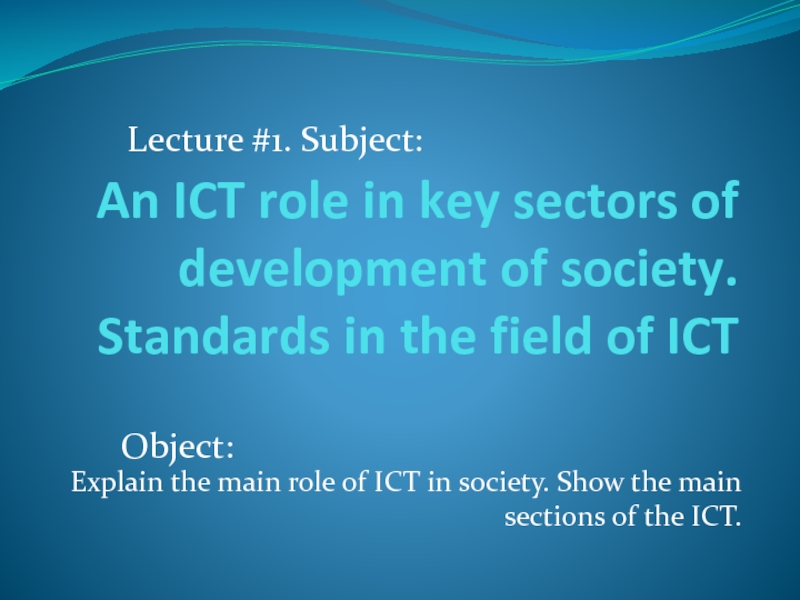
An ICT role in key sectors of development of society. Standards in the field of ICT
Explain the main role of ICT in society. Show the main sections of the ICT.
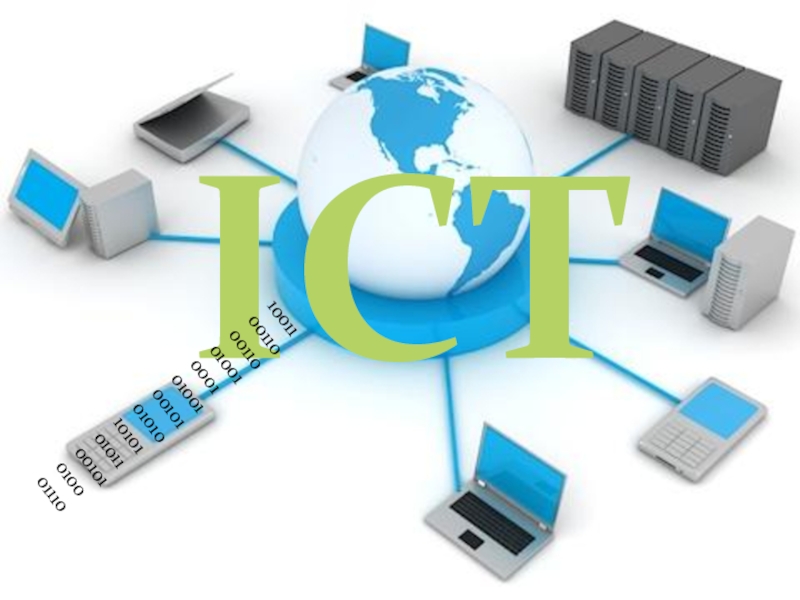
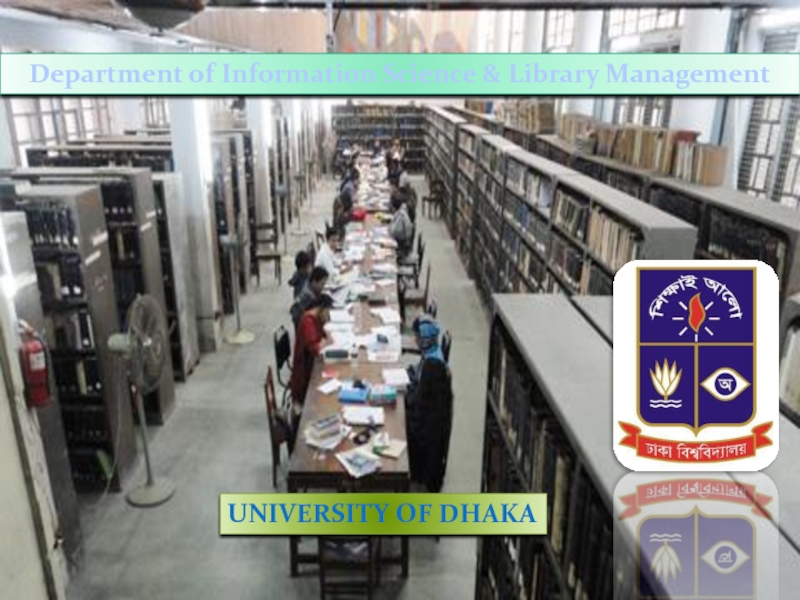
Department of Information Science & Library Management
UNIVERSITY OF DHAKA
* What is ICT?
* Definitions of ICTs
* ICT impact on different fields
* Impact of ICT on society
* Impact of ICT on Education
* Impact of ICT on Communication
* Impact of ICT on Scientific Exploration
* Impact of ICT on Military Force
* Impact of ICT on Economic Structure
* Impact of ICT on Recreation
* Impact of ICT on Transportation
* Impact of ICT on Knowledge Management
* Impact of ICT on Information Institution
* Impact of ICT on Library Materials
* Impact on User Community
* Conclusion
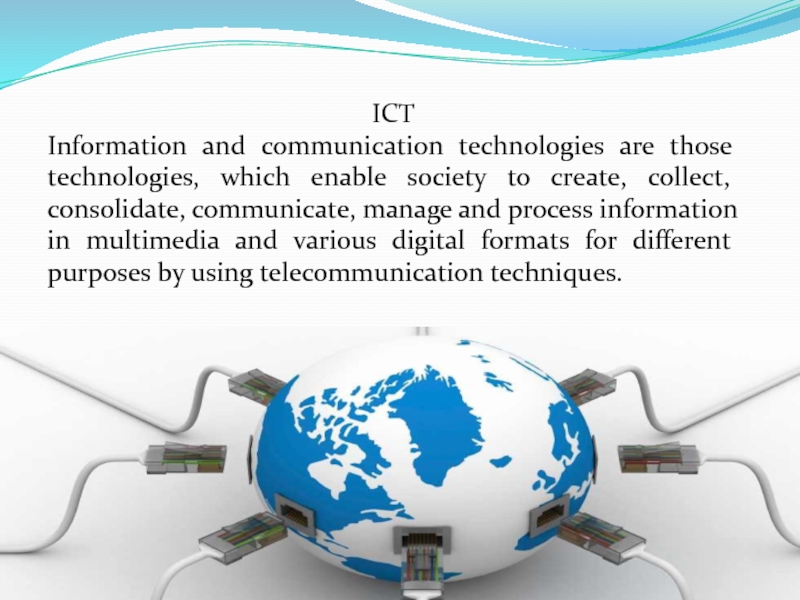
ICT
Information and communication technologies are those technologies, which enable society to create, collect, consolidate, communicate, manage and process information in multimedia and various digital formats for different purposes by using telecommunication techniques.
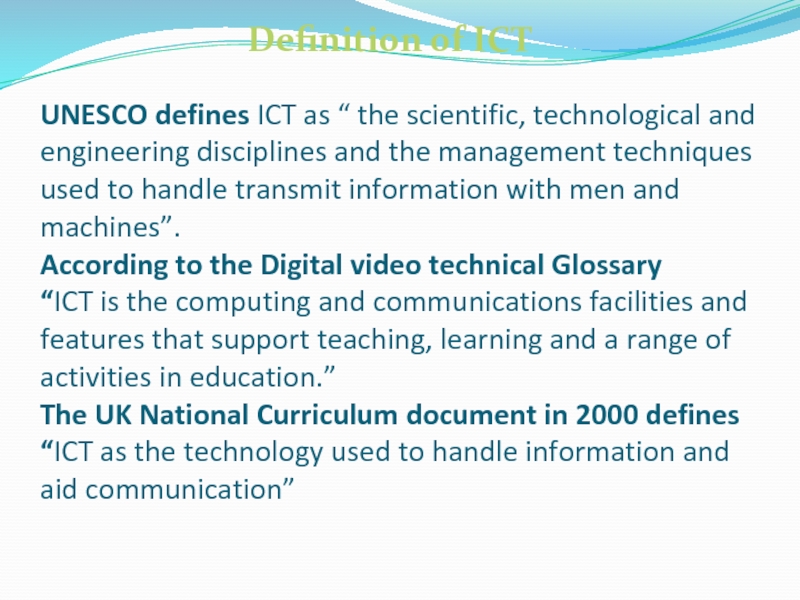
UNESCO defines ICT as “ the scientific, technological and engineering disciplines and the management techniques used to handle transmit information with men and machines”. According to the Digital video technical Glossary “ICT is the computing and communications facilities and features that support teaching, learning and a range of activities in education.” The UK National Curriculum document in 2000 defines “ICT as the technology used to handle information and aid communication”
Definition of ICT
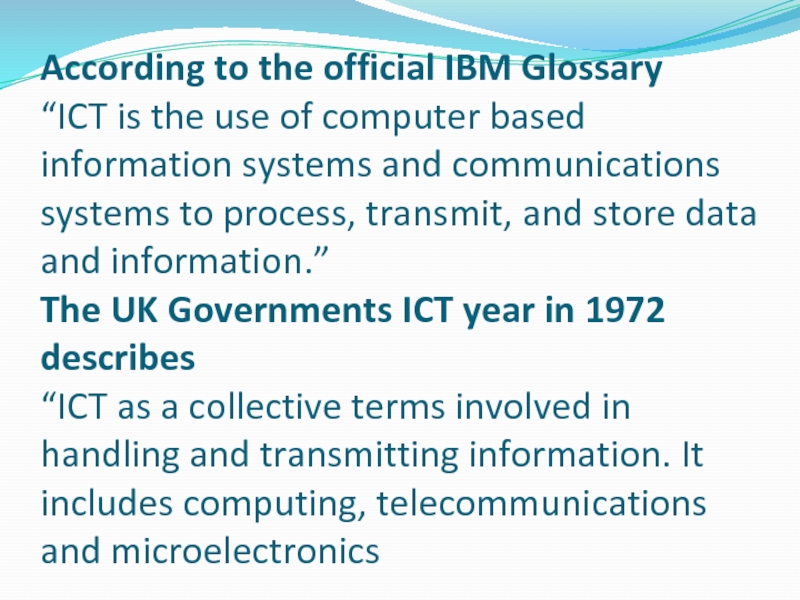
According to the official IBM Glossary “ICT is the use of computer based information systems and communications systems to process, transmit, and store data and information.” The UK Governments ICT year in 1972 describes “ICT as a collective terms involved in handling and transmitting information. It includes computing, telecommunications and microelectronics
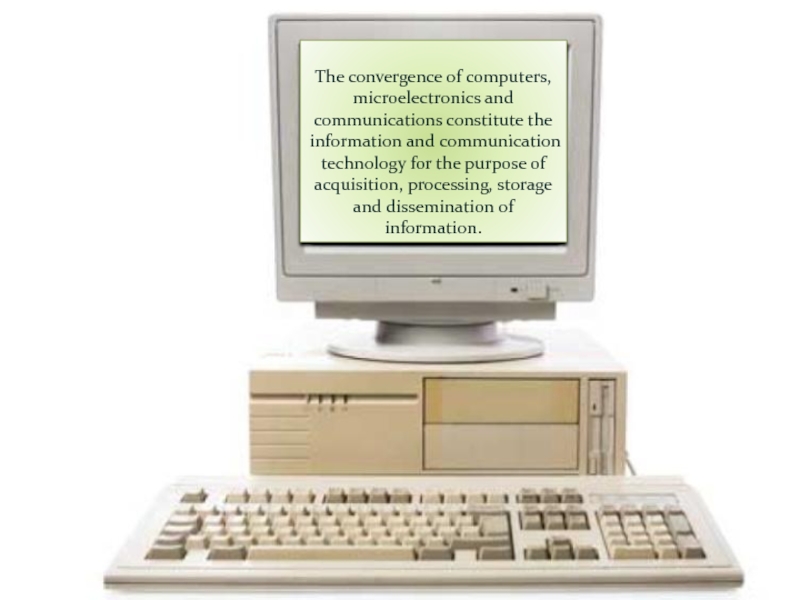
The convergence of computers, microelectronics and communications constitute the information and communication technology for the purpose of acquisition, processing, storage and dissemination of information.
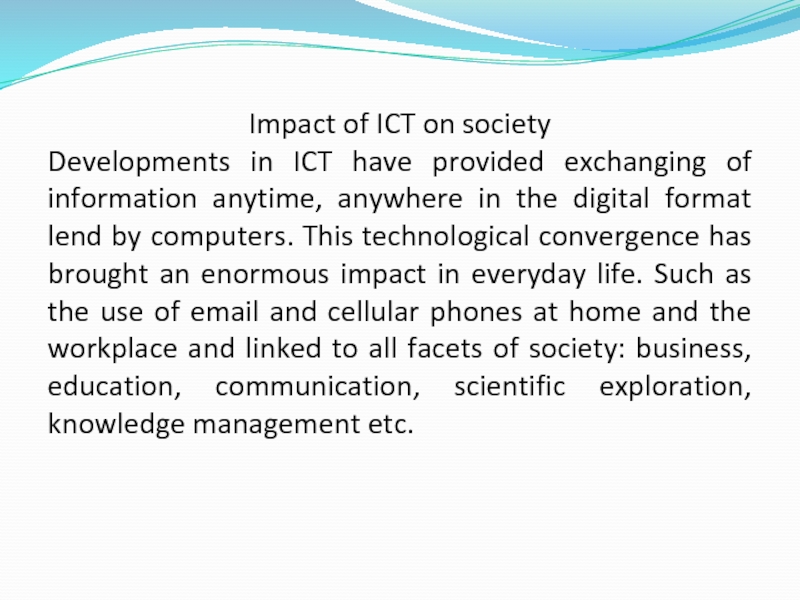
Impact of ICT on society
Developments in ICT have provided exchanging of information anytime, anywhere in the digital format lend by computers. This technological convergence has brought an enormous impact in everyday life. Such as the use of email and cellular phones at home and the workplace and linked to all facets of society: business, education, communication, scientific exploration, knowledge management etc.
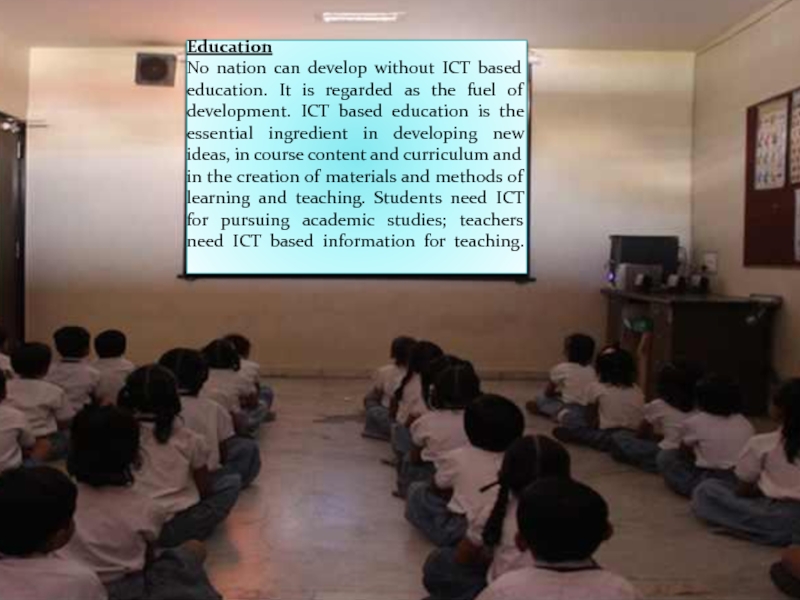
Education No nation can develop without ICT based education. It is regarded as the fuel of development. ICT based education is the essential ingredient in developing new ideas, in course content and curriculum and in the creation of materials and methods of learning and teaching. Students need ICT for pursuing academic studies; teachers need ICT based information for teaching.
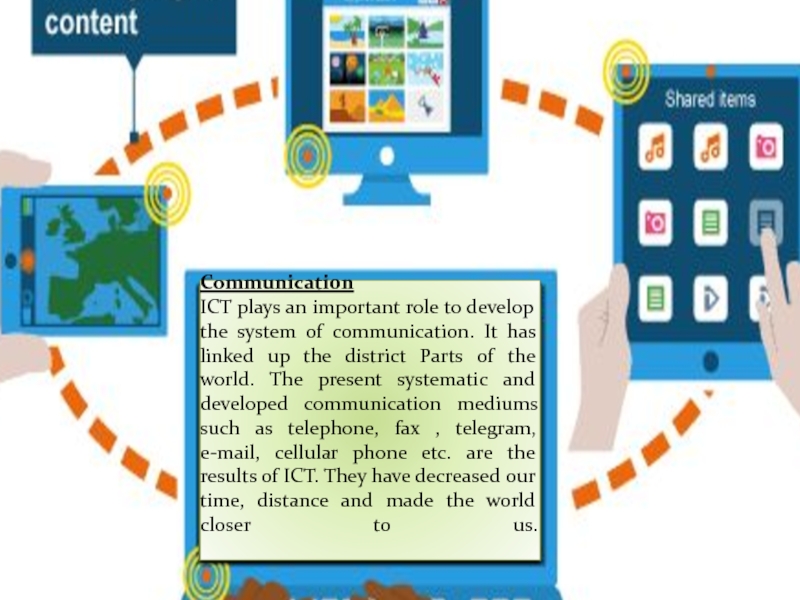
Communication ICT plays an important role to develop the system of communication. It has linked up the district Parts of the world. The present systematic and developed communication mediums such as telephone, fax , telegram, e-mail, cellular phone etc. are the results of ICT. They have decreased our time, distance and made the world closer to us.
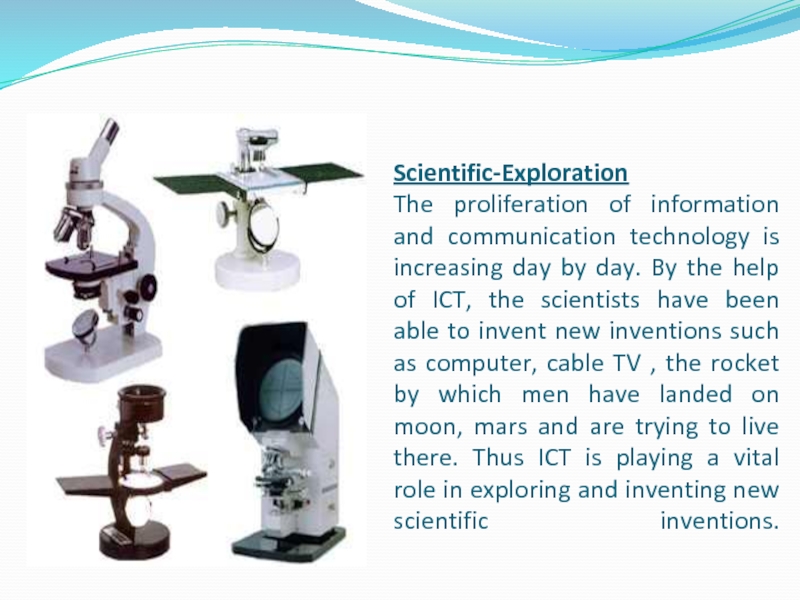
Scientific-Exploration The proliferation of information and communication technology is increasing day by day. By the help of ICT, the scientists have been able to invent new inventions such as computer, cable TV , the rocket by which men have landed on moon, mars and are trying to live there. Thus ICT is playing a vital role in exploring and inventing new scientific inventions.
Military-Force To protect any country from the attack of enemies, a strong and well-organized military force is a must. ICT plays as a key role to strong and organized the military force of any country by providing real information. So , it is an important component for the military sector.
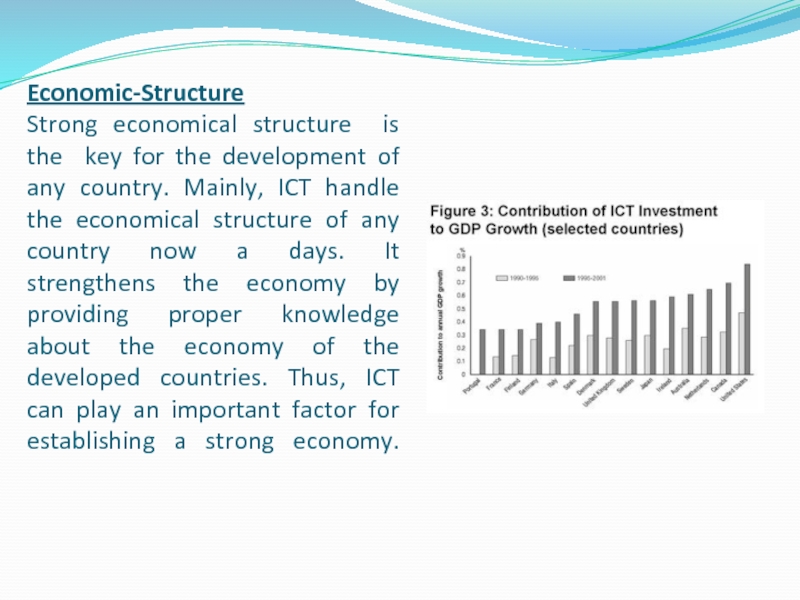
Economic-Structure Strong economical structure is the key for the development of any country. Mainly, ICT handle the economical structure of any country now a days. It strengthens the economy by providing proper knowledge about the economy of the developed countries. Thus, ICT can play an important factor for establishing a strong economy.
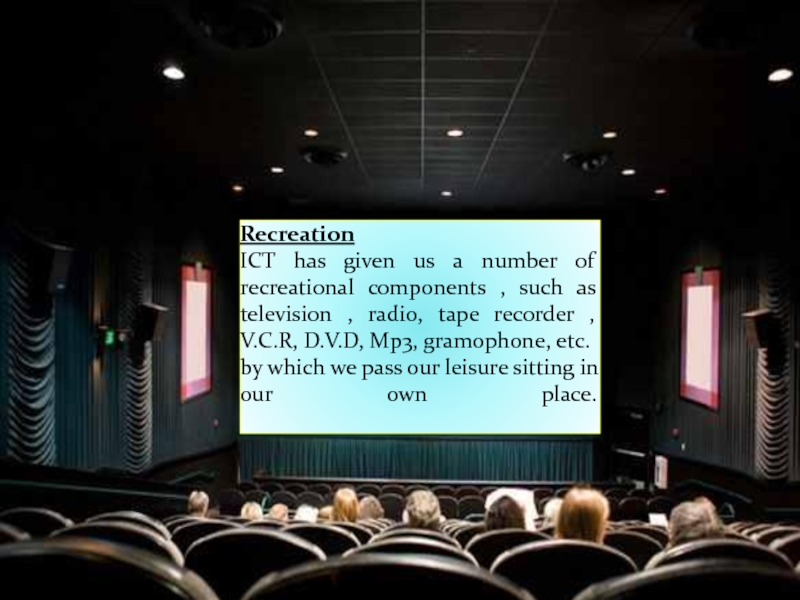
Recreation ICT has given us a number of recreational components , such as television , radio, tape recorder , V.C.R, D.V.D, Mp3, gramophone, etc. by which we pass our leisure sitting in our own place.
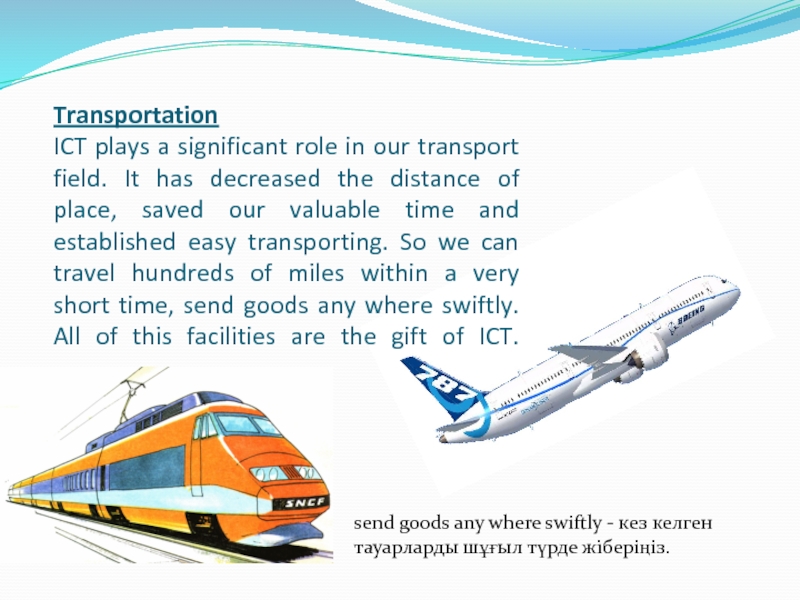
Transportation ICT plays a significant role in our transport field. It has decreased the distance of place, saved our valuable time and established easy transporting. So we can travel hundreds of miles within a very short time, send goods any where swiftly. All of this facilities are the gift of ICT.
send goods any where swiftly - кез келген тауарларды шұғыл түрде жіберіңіз.
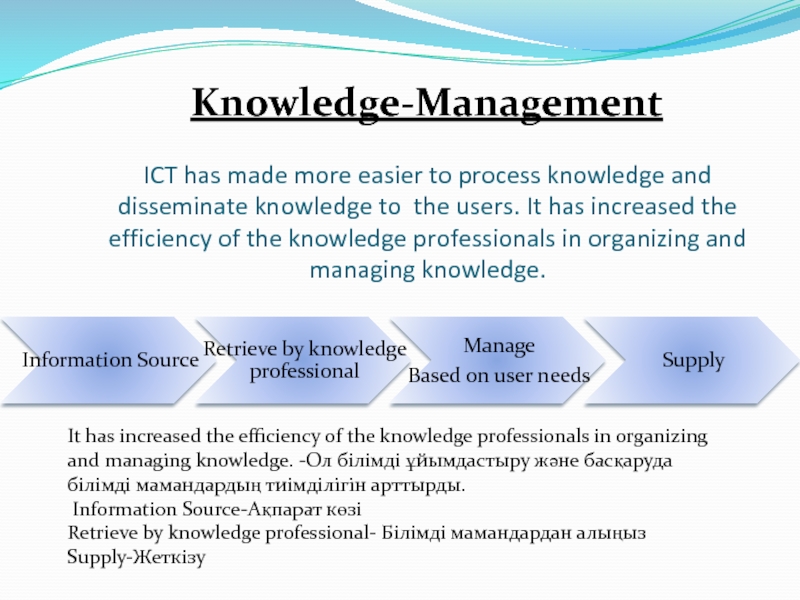
ICT has made more easier to process knowledge and disseminate knowledge to the users. It has increased the efficiency of the knowledge professionals in organizing and managing knowledge.
It has increased the efficiency of the knowledge professionals in organizing and managing knowledge. -Ол білімді ұйымдастыру және басқаруда білімді мамандардың тиімділігін арттырды.
Information Source-Ақпарат көзі
Retrieve by knowledge professional- Білімді мамандардан алыңыз
Supply-Жеткізу
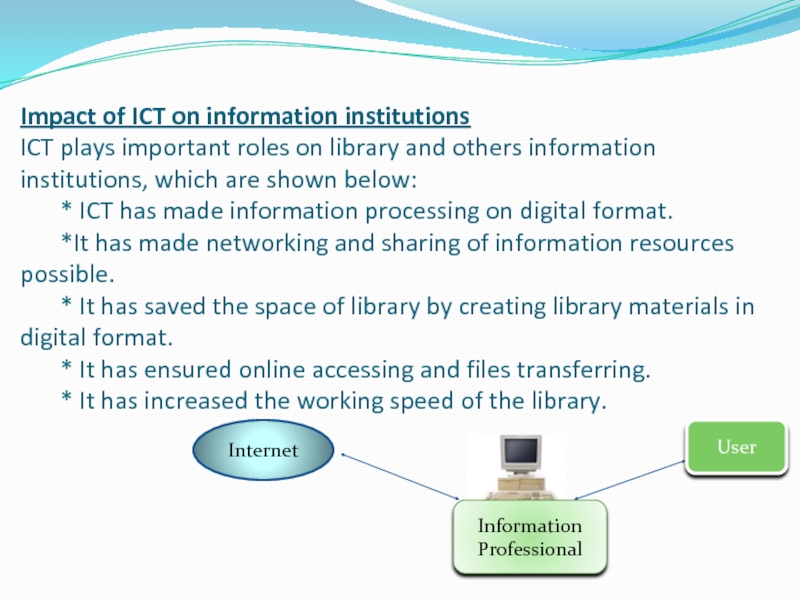
Impact of ICT on information institutions ICT plays important roles on library and others information institutions, which are shown below: * ICT has made information processing on digital format. *It has made networking and sharing of information resources possible. * It has saved the space of library by creating library materials in digital format. * It has ensured online accessing and files transferring. * It has increased the working speed of the library.
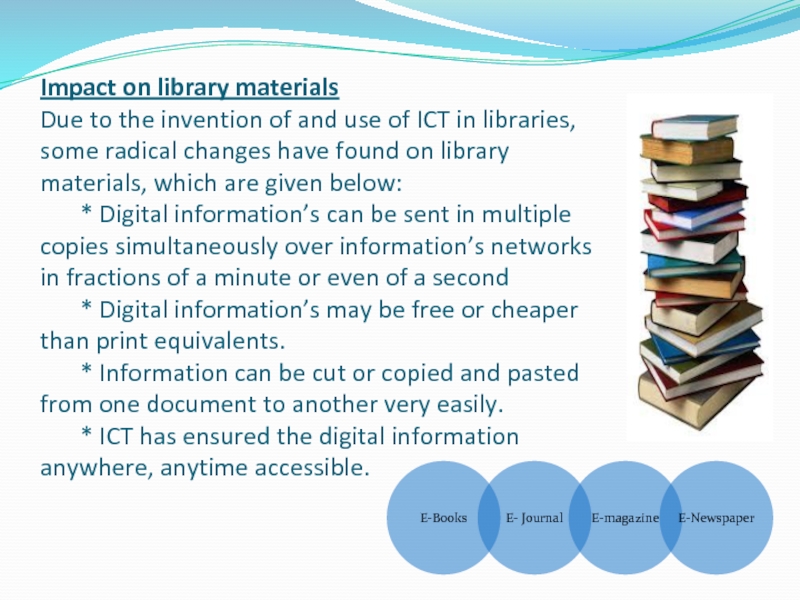
Impact on library materials Due to the invention of and use of ICT in libraries, some radical changes have found on library materials, which are given below: * Digital information’s can be sent in multiple copies simultaneously over information’s networks in fractions of a minute or even of a second * Digital information’s may be free or cheaper than print equivalents. * Information can be cut or copied and pasted from one document to another very easily. * ICT has ensured the digital information anywhere, anytime accessible.
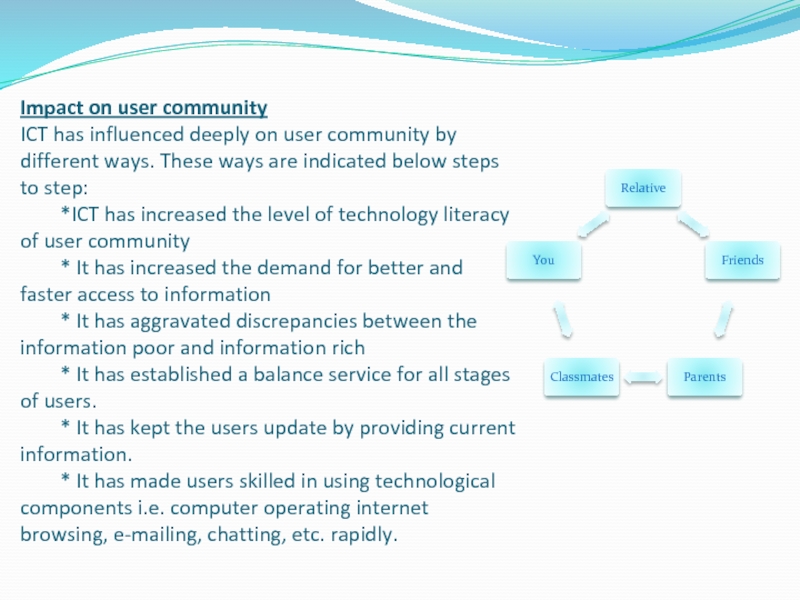
Impact on user community ICT has influenced deeply on user community by different ways. These ways are indicated below steps to step: *ICT has increased the level of technology literacy of user community * It has increased the demand for better and faster access to information * It has aggravated discrepancies between the information poor and information rich * It has established a balance service for all stages of users. * It has kept the users update by providing current information. * It has made users skilled in using technological components i.e. computer operating internet browsing, e-mailing, chatting, etc. rapidly.
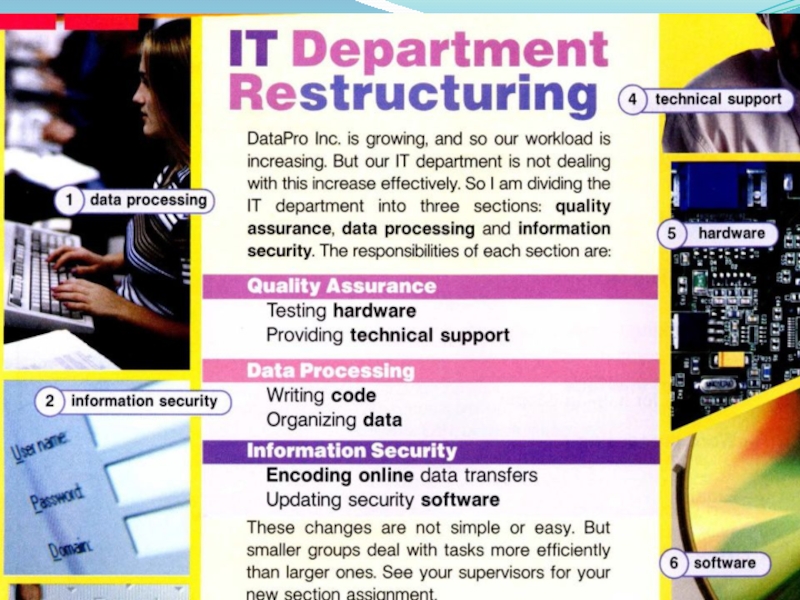
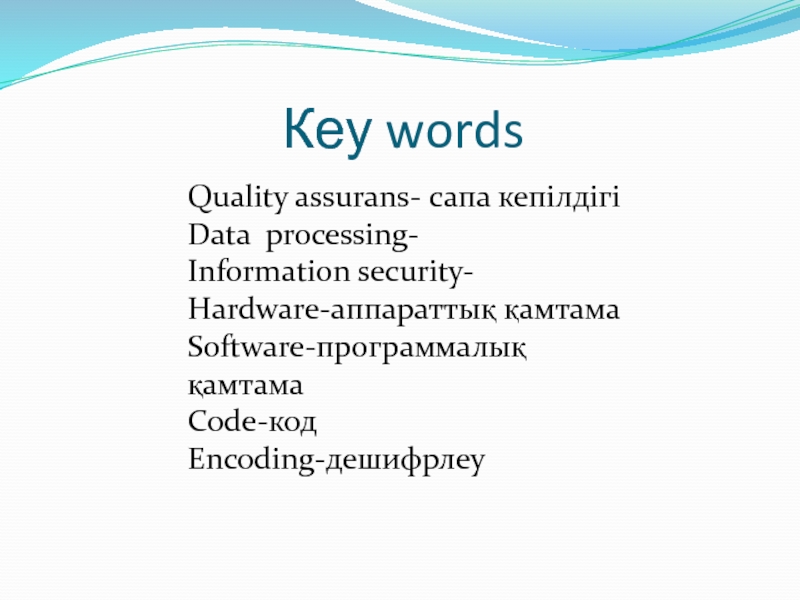
Quality assurans- сапа кепілдігі
Data processing-
Information seсurity-
Hardware-аппараттық қамтама
Software-программалық қамтама
Code-код
Encoding-дешифрлеу
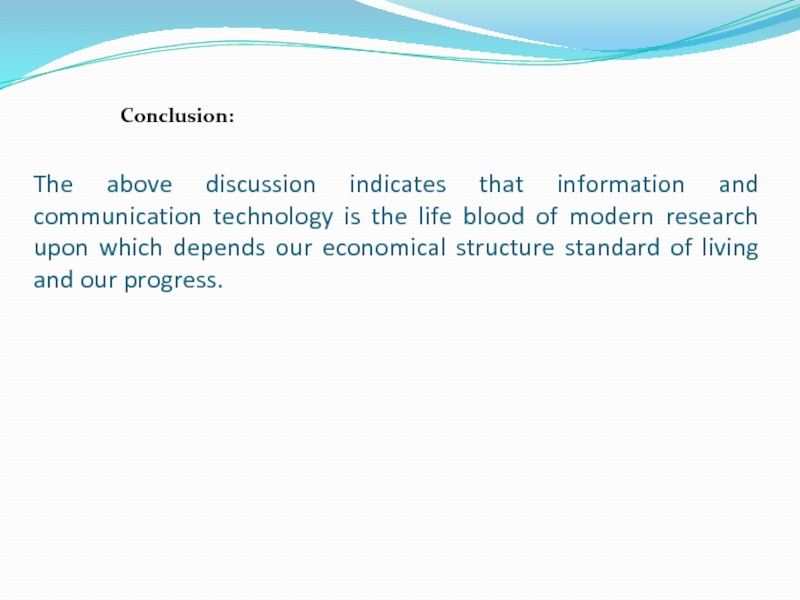
The above discussion indicates that information and communication technology is the life blood of modern research upon which depends our economical structure standard of living and our progress.
Читайте также:

